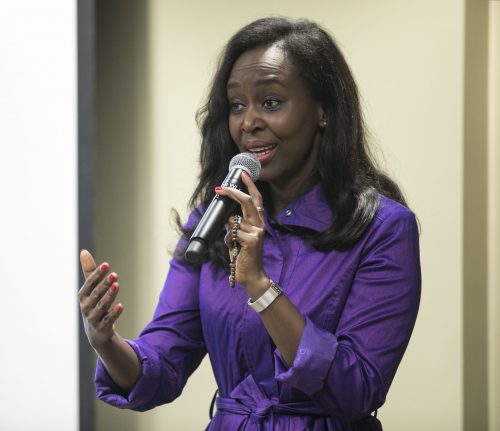Rwandan genocide survivor speaks of hope and forgiveness
November 13, 2017
As part of DePaul’s President’s Signature Series and the inauguration of President A. Gabriel Esteban, Rwandan author and motivational speaker Immaculée Ilibagiza came to DePaul University to share her experience as a survivor of the Rwandan genocide on Wednesday, Nov. 8.
Esteban asked Ilibagiza to share her story after hearing Ilibagiza speak during his previous position as president of Seton Hall University in 2009. Seton Hall subsequently made Ilibagiza’s book, “Left to Tell,” required reading for all freshmen.
“Her story is even more appropriate today as we, as a nation, turn our backs on the least among us.” Esteban said. “Her story of forgiveness in light of unspeakable horrors is something we can all learn from during these difficult times.”

(Sarah Julien/The DePaulia)
President Esteban introduced Ilibagiza to over 50 DePaul students and faculty. Standing in the room on the third floor of the Student Center in a royal purple dress, she began to tell her story.
Ilibagiza was born and raised in a small village in Rwanda. She had a peaceful childhood with her parents and three brothers until she came home from the National University of Rwanda on Easter break in 1994. Political turmoil broke out when the Hutu president of Rwanda’s plane was shot down on April 6, 1994. The division between the two tribes of Tutsi and Hutu has a long history of pain, but the casual propaganda that filtered through radio broadcastings soon emerged as an outright cry from the Rwandan government to kill and slaughter every Tutsi tribe member.
“The reason behind the genocide is the fear to share the power,” Ilibagiza said. “If the (Tutsis) ever took the power then they would have to share. So, the plan began to kill the Tutsis so they wouldn’t have to deal with them.”
Over one million Rwandan citizens were slaughtered within the span of three months.
In fear of men raping and harming Ilibagiza, her father sent her to hide in the village pastor’s house. The pastor happened to have been a Hutu, the sworn enemy of the Tutsi.
“This was a big lesson for me that was stamped into my heart,” Ilibagiza said. “My father always used to tell us to not judge people and put them in boxes. Don’t judge people because they come from the other tribe. Always judge people as they present themselves to you. If you do judge, you will miss out on many angels in your life. You don’t know who God is going to send to you when you need it the most.”
With only a rosary in hand, the pastor agreed to hide Ilibagiza and seven other Tutsi women, between the ages of 7 and 55, in one 3-foot by 4-foot bathroom.
“We were not allowed to speak, we were not allowed to turn on the water and if we had to flush the toilet we had to do it at the same time as the other bathroom,” Ilibagiza said. “I only found out the women’s names 10 years after the genocide. When you go through something serious, names become just fancy — you don’t need them. We only need to know that it is another human like you.”
From the time Ilibagiza went into hiding, Hutus began running wild across the small country bombing churches and stadiums where people gathered to find refuge. When that wasn’t enough, the order came over the radios to go from home to home searching every village for Tutsis — an order from the government to purify and cleanse the country.
“It was the worst day that I had known,” Ilibagiza said. “I saw them through the window of the bathroom — men dressed in banana leaves with long spears, machetes and grenades — men who had come to search the pastor’s house. These people were my neighbors, my friends, and I remember hearing one who was sitting outside say he had killed 399 people. He mentioned my name as the 400th person he wanted to kill. I knew then in my heart that nothing good comes out of evil and hate.”
They were hiding in a four-bedroom home with no basement or upstairs. Ilibagiza said that “to wait to be killed was so painful, you wish to die.”
“One voice was telling me to open the door, it was too painful, and end the torture,” Ilibagiza said. “But there was also another voice that was telling me to ask God to help me and to remember that God is almighty —he can do anything.”
She began praying so fervently that she passed out. Five hours later when she awoke, the pastor had returned to tell them that they were saved — for now. Three to four hundred Hutu tribe members had ransacked the home searching for hidden Tutsis — they even cut open the ceiling and luggage to look for hidden babies. There is not a logical explanation for why the Hutus did not find their hiding spot after multiple raids of the pastor’s home.
“I remember thinking God was real,” Ilibagiza said. “If he heard me from the bathroom — (God) can hear anything.”
This was a gift to Ilibagiza because now she could find refuge in speaking with the Lord. In that overcrowded bathroom, she found strength in the Bible and God. The largest struggle that she wrestled with was forgiveness.
“How do you forgive in a situation where you are hurt so badly and those who hurt you have not stopped?” Ilibagiza said. “I kept praying until one day the words Jesus spoke on the cross struck me.”
In the New Testament, Luke 23:34 states, “Father, forgive them; for they do not know what they do.”
“I remember thinking oh, they are blinded,” Ilibagiza said. “But blinded by what? By hatred and selfishness. The hatred is so strong that it blinded their sense of self. I asked how someone could kill a child and say I get it? They did not understand what they did. A huge luggage was lifted from my shoulder, and the heaviness, anger and hatred left me even before the killings had stopped. “
When the war killings ended, Ilibagiza had been in hiding for 91 days and weighed only 65 pounds. She learned that her parents, grandparents, two brothers, classmates and friends had all been killed during the Hutu killing sprees. Later, she stood in front of the man who killed her family and offered him forgiveness.
“To express my forgiveness to him wasn’t hard, what was hard was to actually understand and accept forgiveness,” Ilibagiza said. “I pray that the same grace can touch you. Each one of us has our own sufferings, in some ways our own bathrooms. From my heart to yours I just want to tell you, please, no matter what you are facing that there is always hope.”
Ilibagiza concluded her speech by saying, “Don’t give up God, don’t give up goodness and don’t give up love. If I can forgive, anyone can forgive.”
“There are distinct times in my life when something forces me to look up and causes me to reflect on who I am in the world,” said Lawrence Hamer from DePaul’s Academic Affairs. “This afternoon was one of those moments for me. I was quite taken by today’s message, but mostly by Ilibagiza’s challenge to choose kindness.”
Esteban said, “When I first read the book and listened to her, I think how can one forgive?”
“For me, it is a message of love, hope, resilience and faith. It doesn’t matter what faith you are, but as long as you have faith, it is a powerful, powerful way to keep hope alive. I thought the message in this day and age would hopefully resonate with our campus.”



